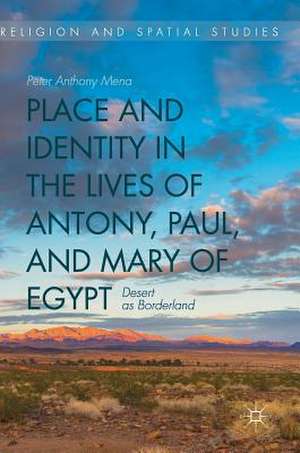Place and Identity in the Lives of Antony, Paul, and Mary of Egypt: Desert as Borderland: Religion and Spatial Studies
Autor Peter Anthony Menaen Limba Engleză Hardback – 8 mai 2019
Preț: 580.49 lei
Preț vechi: 682.93 lei
-15% Nou
Puncte Express: 871
Preț estimativ în valută:
111.09€ • 115.32$ • 92.63£
111.09€ • 115.32$ • 92.63£
Carte tipărită la comandă
Livrare economică 22 martie-05 aprilie
Preluare comenzi: 021 569.72.76
Specificații
ISBN-13: 9783030173272
ISBN-10: 3030173275
Pagini: 116
Ilustrații: XV, 123 p. 1 illus.
Dimensiuni: 148 x 210 mm
Greutate: 0.32 kg
Ediția:1st ed. 2019
Editura: Springer International Publishing
Colecția Palgrave Macmillan
Seria Religion and Spatial Studies
Locul publicării:Cham, Switzerland
ISBN-10: 3030173275
Pagini: 116
Ilustrații: XV, 123 p. 1 illus.
Dimensiuni: 148 x 210 mm
Greutate: 0.32 kg
Ediția:1st ed. 2019
Editura: Springer International Publishing
Colecția Palgrave Macmillan
Seria Religion and Spatial Studies
Locul publicării:Cham, Switzerland
Cuprins
1. Introduction: Mapping the Desert, Mapping Identity in Late Antiquity.- 2. Anzaldúa, Space Theorist: Mapping Ancient Hagiographies.- 3. Tierra Natal: Athanasius’s Desert as Mestiza Homeland.- 4. Saints, Centaurs, and Satyrs: Going Wild in the Desert.- 5. The Holy Harlotry of Mestizaje.- 6. Conclusion: The Functions of the Frontera in the Late Ancient Imagination.
Notă biografică
Peter Anthony Mena is Assistant Professor of Theology and Religious Studies at the University of San Diego, USA
Textul de pe ultima copertă
In this book, Peter Anthony Mena looks closely at descriptions of space in ancient Christian hagiographies and considers how the desert relates to constructions of subjectivity. By reading three pivotal ancient hagiographies—the Life of Antony, the Life of Paul the Hermit, and the Life of Mary of Egypt—in conjunction with Gloria Anzaldúa’s ideas about the US/Mexican borderlands/la frontera, Mena shows readers how descriptions of the desert in these texts are replete with spaces and inhabitants that render the desert a borderland or frontier space in Anzaldúan terms. As a borderland space, the desert functions as a device for the creation of an emerging identity in late antiquity—the desert ascetic. Simultaneously, the space of the desert is created through the image of the saint. Literary critical, religious studies, and historical methodologies converge in this work in order to illuminate a heuristic tool for interpreting the desertin late antiquity and its importance for the development of desert asceticism. Anzaldúa’s theories help guide a reading especially attuned to the important relationship between space and subjectivity.
Caracteristici
Winner of the 2020 Hispanic Theological Initiative (HTI) Book Prize Uses methodologies of literary criticism and history Utilizes Gloria Anzaldúa's theories as a guide Illustrates how space and identity can only be determined in conjunction with one another


